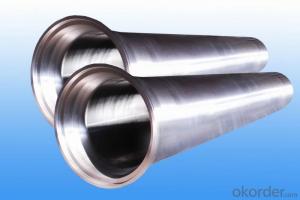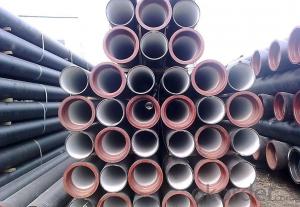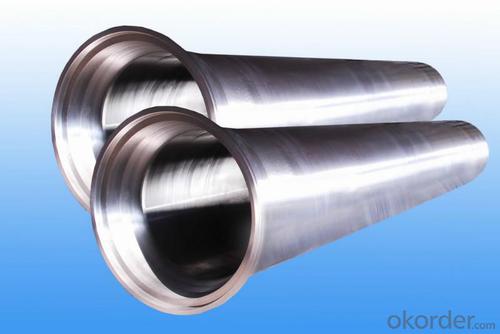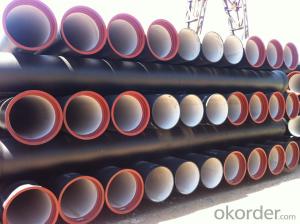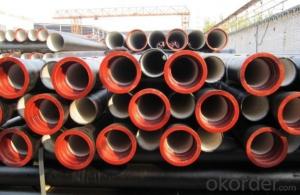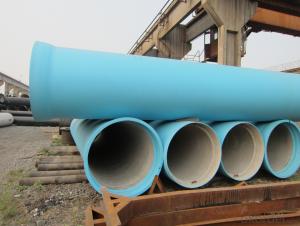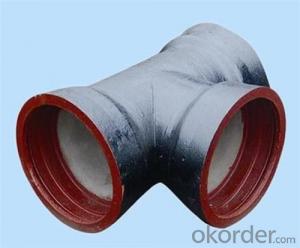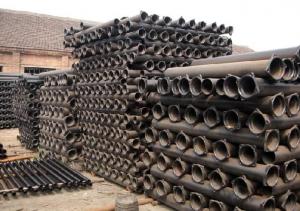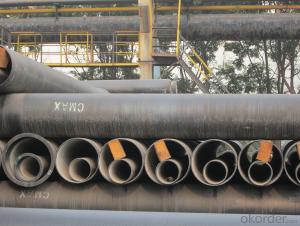Ductile Iron Pipe of China DN100 EN545 C25 Sanitary
- Loading Port:
- China main port
- Payment Terms:
- TT or LC
- Min Order Qty:
- 20 m.t.
- Supply Capability:
- 200000 m.t./month
OKorder Service Pledge
OKorder Financial Service
You Might Also Like
1,Ductile Iron Pipe Description :
1) Pipes confirm to ISO2531,K9 class,T type joint,6m long,with inside cements lining conform to ISO4179, outside Zinc spraying(130g/m2) and bitumen coating(70μm) conform to ISO8179.
2) Pipe ends: Spigot and socket ends, with 100% SBR rubber gaskets accoding to ISO4633
3) we can do third party inspection according to customer's request.
4) Our products have been sold to many international market,such as Middle East and South East Asia and Africa.
2,Main Features of the Ductile Iron Pipe:
·High yield strength
·High tensile Strength
·High corrosion resistance
·Pressure Resistence
·Anti-corrosion
·Installation is convenient
·Satisfy the highest hygienic standards
3,Ductile Iron Pipe Images:
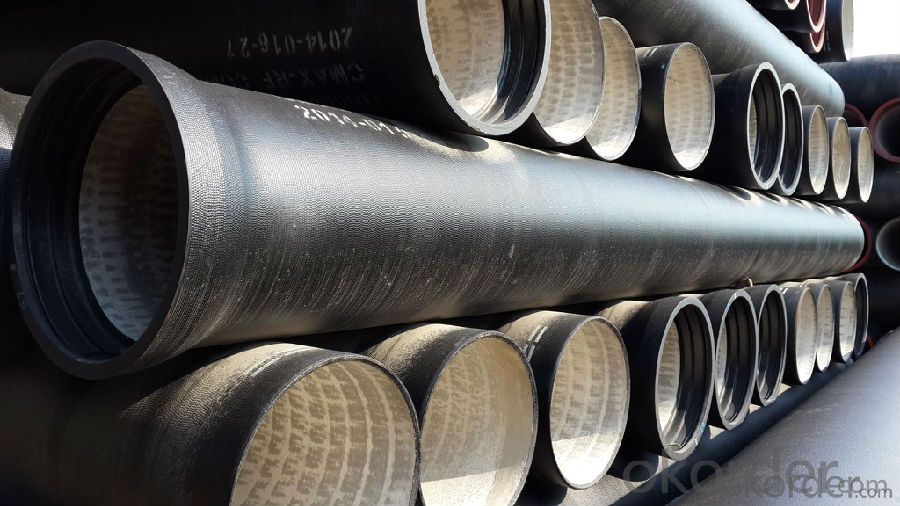
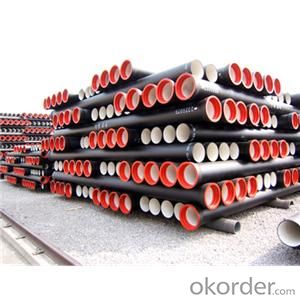
4. Ductile Iron Pipe Specification
Standard: API SPEC 5L 44th eidtion,ASTM A252-98(2007)
Grade: A53 Grades A/B, ASTM A106 Grades B/C,ASTM A179
AWWA, C200, ASTM A139, ASTM A120, API 5L Grade B
X42, X52, X56, X60, X65, X70, X80, X100
Weld Alternatives: LSAW
OD size range: 6.4~44.5mm
Wall thickness: 406.4~1422mm
Length: 3 - 12 m according to requirment
Note: Other grade can also be provided after consulting. Special design are available
for coal slurry conveyance LSAW line tube -- Service.
Internal lining: ductile iron pipes shall have an internal cement mortar lining in acc with ISO4179.
External coating: ductile iron pipes shall be externally coated with metallic zinc spray plus a further layer of resin painting to ISO8179.
Gasket: 100% SBR/NBR/EPDM rubber gasket in accordance with ISO4633.
Packing: ductile iron pipes from DN100 to DN300 be bundled with steel belts, others are in bulk.
Payment term: L/C, T/T.
Packing: In bulk vessel or in container
5.FAQ:
We have organized several common questions for our clients,may help you sincerely:
1.Q: Why would you choose ductile iron pipe rather than other pipe materials?
A:The reasons are obvious for that not only ductile iron pipe possesses the inherent strength and flexibility of ductile iron, combined with proven corrosion protection systems, but also the cost savings can be achieved from design to installation and commissioning.
2.Q:Why can you guarantee the inner of pipes can’t be corroded?
A: High alumina cement mortar lining and sulphate-resistant cement mortar lining. These two special linings are applicable to inner anti-corrosion for sewage pipes, improving resistance to erosion of the sewage components.
- Q: What are the lubricants for the installation of ductile iron pipes for tap water?
- Lubricant used to reduce frictional resistance of friction pairs and to retard wear of lubricating medium.
- Q: How do ductile iron pipes handle pressure surges in pumping stations?
- Ductile iron pipes are specifically designed to handle pressure surges in pumping stations effectively. The inherent strength and flexibility of ductile iron make it well-suited to withstand the sudden increase in pressure that can occur during pump start-up or shutdown. One of the key features of ductile iron pipes is their ability to absorb and dissipate energy. When a pressure surge occurs, the ductile iron pipes have the capacity to absorb the excess pressure and distribute it evenly throughout the pipe network. This helps to minimize the impact of the surge and prevent any potential damage to the pipes or the pumping station. Additionally, ductile iron pipes have a high resistance to impact and stress, which further enhances their ability to handle pressure surges. The pipes are manufactured using a unique process that imparts strength and durability, allowing them to withstand the forces exerted during pressure fluctuations without any significant deformation or failure. Furthermore, ductile iron pipes have a smooth internal surface, which reduces friction and turbulence within the pipe network. This smooth flow characteristic helps to mitigate the effects of pressure surges by allowing the water to move efficiently without creating additional stress on the pipes. In summary, ductile iron pipes are specifically engineered to handle pressure surges in pumping stations by absorbing and dissipating the excess pressure, withstanding the impact and stress, and promoting smooth flow. Their robustness and reliability make them an ideal choice for applications where pressure fluctuations are common, ensuring the longevity and efficiency of the pumping infrastructure.
- Q: What are the specifications of cast iron pipes?
- To be divided into: cast cast pipe. Cast iron pipes are used for water supply, drainage and gas transmission lines. They include cast iron pipes and pipe fittings. Labor intensity is small. According to the casting method, it is divided into continuous cast iron pipe and centrifugal cast iron pipe, in which the centrifugal cast iron pipe is divided into sand mould and metal type two kinds. Divided into gray cast iron pipe and nodular cast iron pipe according to different material. Rubber ring seals for flexible interfaces,
- Q: How do ductile iron pipes handle ground settlement?
- Due to their inherent flexibility and resistance to deformation, ductile iron pipes are highly effective in managing ground settlement. The exceptional qualities of ductile iron, such as its high tensile strength and elongation capacity, make it an ideal material for enduring ground movement. When ground settlement occurs, characterized by the downward shifting of soil or sediment, ductile iron pipes possess the capability to flex and adapt to the changing ground without fracturing. The pipes can absorb the stress caused by settlement and evenly distribute it along their length, minimizing the likelihood of cracks or breaks. Moreover, ductile iron pipes are constructed with a bell and spigot joint system, which permits slight movement and rotation at the joints. This characteristic allows the pipes to accommodate ground settlement by absorbing any misalignment or shifting of the surrounding soil. Furthermore, ductile iron pipes exhibit a greater load-bearing capacity than alternative materials like PVC or HDPE. This implies that they can endure heavier loads and pressures from the surrounding soil, reducing the possibility of pipe failure or collapse during ground settlement. In conclusion, ductile iron pipes are excellently equipped to handle ground settlement due to their flexibility, resistance to deformation, and ability to evenly distribute stress. Their unique properties ensure their ability to withstand the challenges presented by shifting ground conditions, making them a dependable choice for underground infrastructure projects.
- Q: How are ductile iron pipes manufactured?
- Ductile iron pipes are manufactured through a process known as centrifugal casting, which involves the use of a spinning mold. The process begins with the selection and preparation of high-quality ductile iron, which is a type of cast iron that contains small amounts of magnesium to enhance its strength and ductility. First, the ductile iron is melted in a furnace at extremely high temperatures. Once the molten iron reaches the desired temperature, it is poured into a spinning mold. The spinning mold is designed in the shape of a pipe, and it rotates at a high speed to distribute the molten iron evenly along its inner surface. As the mold spins, the molten iron cools and solidifies against the mold walls. This rapid cooling results in a fine-grained structure and enhances the mechanical properties of the pipe, such as its strength and durability. The spinning mold continues to rotate until the pipe has completely solidified, which typically takes a few minutes. After solidification, the pipe is removed from the mold, and excess material, known as the "skin," is removed. The skin is typically removed by machining or grinding to achieve the desired dimensions and surface finish. Next, the pipe undergoes heat treatment to further enhance its mechanical properties and reduce internal stresses. Once the heat treatment is completed, the pipe is thoroughly inspected for any defects or imperfections. This includes visual inspections, non-destructive testing methods, and pressure testing to ensure the pipe meets the required specifications and standards. If any defects are detected, the pipe may be repaired or rejected depending on the severity of the issue. Finally, the pipes are coated with a protective layer to prevent corrosion and enhance their longevity. This coating can be applied through various methods, such as cement mortar lining, epoxy coating, or zinc coating. Overall, the manufacturing process of ductile iron pipes involves melting the iron, centrifugal casting, cooling, skin removal, heat treatment, inspection, and coating. This process ensures the production of high-quality pipes that possess excellent strength, durability, and resistance to corrosion.
- Q: Can ductile iron pipe be used for both water and wastewater applications?
- Yes, ductile iron pipe can be used for both water and wastewater applications. Ductile iron is a type of iron that has been treated with small amounts of magnesium to create a more flexible and durable material. This makes it suitable for transporting both water and wastewater. Ductile iron pipes are known for their high strength and resistance to corrosion, making them ideal for underground applications. They can handle the high pressures and varying flow rates associated with water distribution systems, as well as the corrosive nature of wastewater. Additionally, ductile iron pipes have a longer lifespan compared to other materials commonly used in water and wastewater applications, such as PVC or concrete. Therefore, they are often chosen for projects that require a reliable and long-lasting pipe material for both water and wastewater transport.
- Q: What is the expected joint restraint method for ductile iron pipes?
- Typically, when it comes to joint restraint methods for ductile iron pipes, the two commonly used options are mechanical joints or push-on joints. Both of these joint types are reliable and prevent leaks, ensuring the stability and integrity of the pipeline system. Mechanical joints involve the use of rubber gaskets and bolts to tightly seal the joints, while push-on joints rely on a groove and rubber gasket system to create a watertight seal. Both methods have excellent joint restraint capabilities and allow for the smooth transmission of fluids or gases through the pipeline without any risk of joint separation or failure. Moreover, these joint restraint methods also make installation and maintenance easier, which is why they are often preferred for ductile iron pipe systems.
- Q: Are ductile iron pipes suitable for desalination plants?
- Ductile iron pipes are the perfect fit for desalination plants. These plants typically need to move large amounts of water, and using ductile iron pipes has numerous advantages that make them an ideal choice for this purpose. To begin with, ductile iron pipes possess exceptional strength and durability, which are crucial for withstanding the high pressure and corrosive nature of desalinated water. They can easily handle the rapid flow rates and maintain their structural integrity over long distances, ensuring a dependable and efficient water transportation system. Furthermore, ductile iron pipes exhibit excellent resistance to corrosion, a key factor in desalination plants where the water often contains high levels of salt and other minerals. The corrosion-resistant properties of ductile iron pipes ensure that the water quality remains uncompromised and that the pipes have a long service life, ultimately reducing the costs associated with maintenance and replacement. Moreover, ductile iron pipes have a remarkable ability to withstand impacts, making them particularly valuable in desalination plants where pipelines may be exposed to external forces or accidental damage. By being able to endure such impacts, the risk of leaks is significantly reduced, ensuring a steady and uninterrupted supply of water. Additionally, compared to materials like stainless steel or PVC, ductile iron pipes are more cost-effective. They come with a lower initial cost and require less maintenance, making them the more economical choice for desalination plants. In conclusion, ductile iron pipes are undoubtedly the perfect fit for desalination plants due to their strength, durability, resistance to corrosion and impacts, as well as their cost-effectiveness. These pipes are well-equipped to meet the demanding requirements of desalination plants, providing a reliable and efficient water transportation system.
- Q: What is the manufacturing process of ductile iron pipes? Thank you
- Made of nodular cast iron: a strict chemical composition, the content of silicon in molten iron requirements than the original carbon gray cast iron, nodular cast iron in reduced manganese, phosphorus, sulfur content of two liquid iron tapping temperature cast iron is higher than the ash, than the compensation sphere, conceived at the disposal of liquid iron temperature. Off line ball three disposal, that is to add a liquid iron ball agent four inoculation disposal of five nodular cast iron activity is poor, thus shorten the larger, higher demand for pouring temperature and pouring system larger size, more use of the riser cold iron by one condensation heat treatment criterion six iron is iron carbon alloy carbon content greater than 2%, the carbon content in ordinary industrial pig iron containing C, SI and 2.5%--4%, and Mn, S, P and other elements, is a product of iron ores in blast furnace. According to the difference in the shape of the carbon in the pig iron, it can be divided into several kinds, such as steelmaking pig iron, forging pig iron and nodular cast iron.
- Q: What does "K8" mean in ductile iron pipe grades?
- In wall thickness, K is the standard for wall thickness. The smaller the figure, the thinner the wall thickness of the same specification.For example, the K7 wall thickness of K8 is less than K8, and the wall thickness of DN500 is less than K9
Send your message to us
Ductile Iron Pipe of China DN100 EN545 C25 Sanitary
- Loading Port:
- China main port
- Payment Terms:
- TT or LC
- Min Order Qty:
- 20 m.t.
- Supply Capability:
- 200000 m.t./month
OKorder Service Pledge
OKorder Financial Service
Similar products
Hot products
Hot Searches
Related keywords
